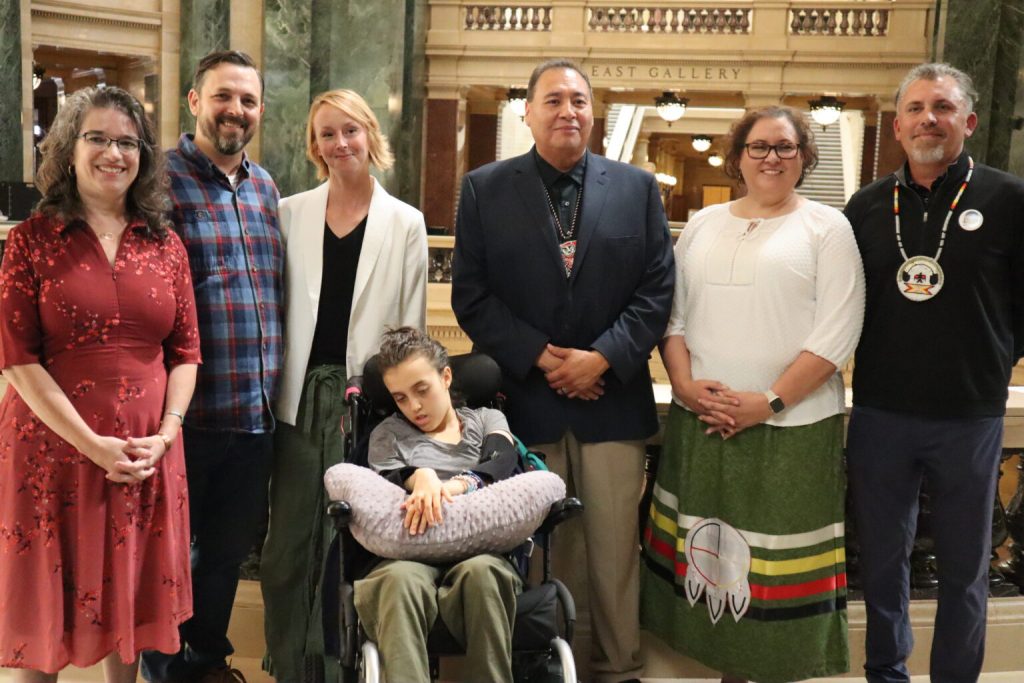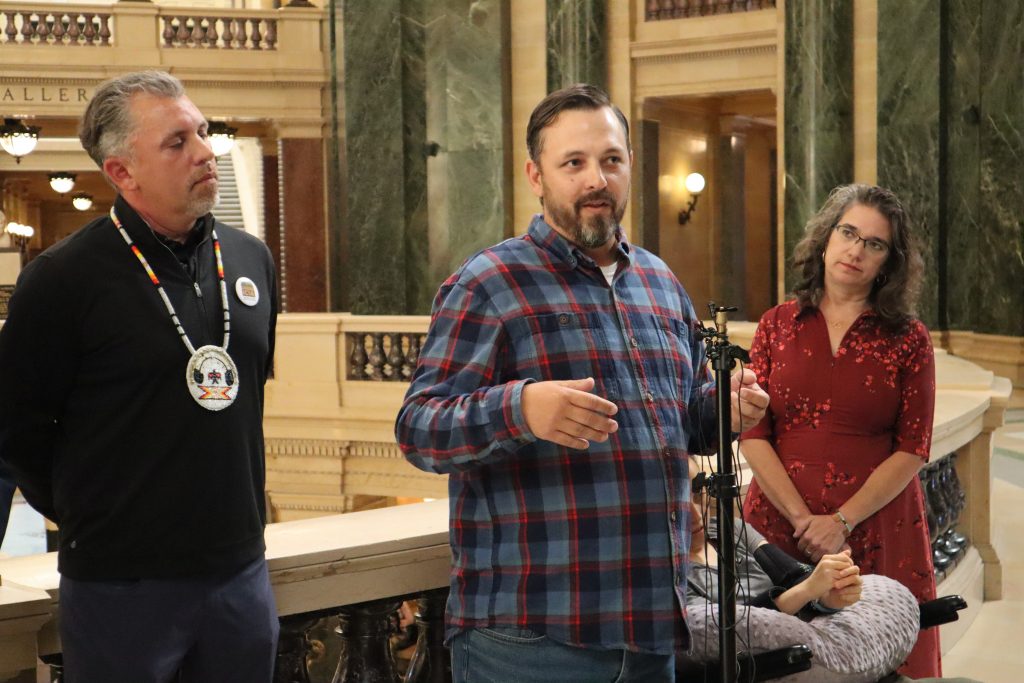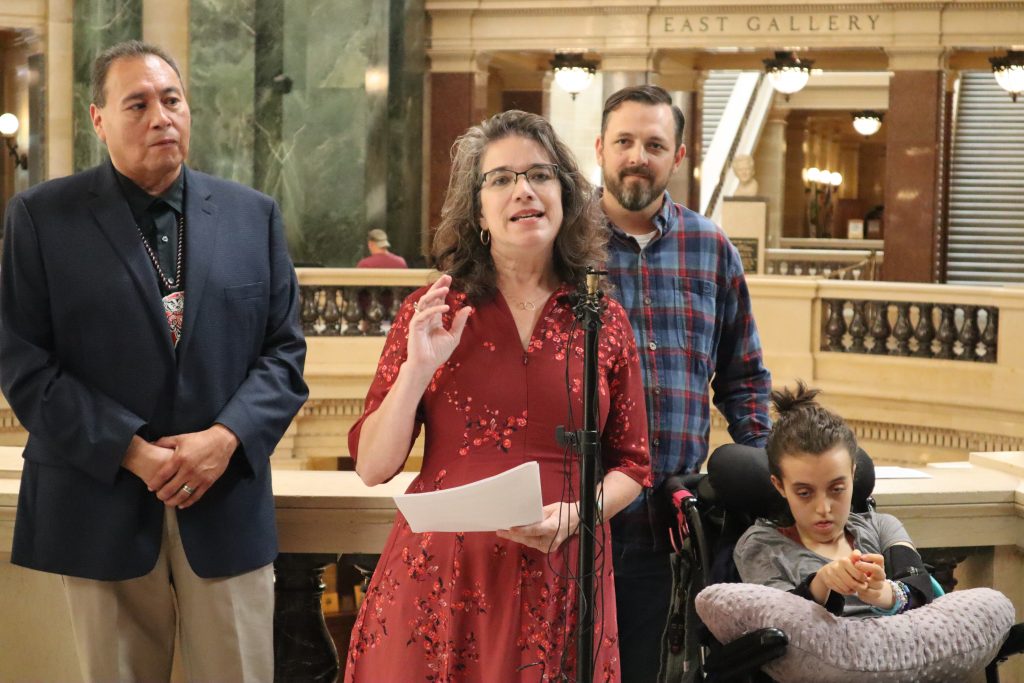Indigenous-Led Campaign Launches to Support Medical Marijuana
New public awareness effort called 'Wisconsin Wellness' pushing for legalization.

(From left to right) Sen. Melissa Agard, Josh and Megan Lowe, Nora Lowe, senior intergovernmental affairs specialist for the St. Croix Chippewa Indians of Wisconsin Michael Decorah, District II representative for Ho-Chunk Nation, Indigenous Cannabis Industry Association founder Rob Pero. (Photo | Isiah Holmes)
“Right now, there is no bill up for legalizing cannabis in our state,” said Rob Pero, founder of the Indigenous Cannabis Industry Association and the owner of Canndigenous, which focuses on providing high quality hemp-derived CBD products to Native American communities. Pero spoke during at a Tuesday morning press conference in the Capitol. “We know that we’ve been sort of stuck in the middle of a prohibition island here between these three other states surrounding us, where our citizens are having to make a choice of whether to really commit a crime to go get their medicine and bring it back to the state.”
Kristin White Eagle, District II representative for the Ho-Chunk Nation and one of the directors of Wisconsin Wellness, said on Tuesday that it’s long past time for Wisconsin to accept cannabis legalization. “I think it’s time that we end that prohibition, we allow this to be a choice for people who need this — medicinal cannabis — for their lives.” White Eagle recalled the struggles of her own grandfather, who survived being a prisoner of war during the Korean War, and did two tours in Vietnam. “This would’ve been really his lifesaver for not only his relationships with his family, but in his own state of mind, and his wellness,” she said, adding, “If we had had the ability to help our veterans in that way, it would’ve been crucial for many relationships that he had.” White Eagle said it is imperative that Wisconsin become “a state of choice for medicinal cannabis.”
Ending cannabis prohibition in Wisconsin has grown more and more popular over the years. Public opinion surveys have shown that 84% of respondents in Wisconsin support medicinal cannabis, with 62% supporting recreational legalization. In November 2022, non-binding ballot initiatives in half a dozen Wisconsin communities asking whether cannabis should be legalized statewide passed with an average of 75% of voters supporting legalization.
What seems to be ample support among the public, however, has not convinced the Legislature. Assembly Speaker Robin Vos has proudly supported a Republican-crafted bill which would create what he called “one of the most restrictive” programs of state-run dispensaries in the country. A very limited number of dispensaries would only provide cannabis in the form of a pill, tincture, topical, vapor, or edible form to patients who suffer from a select number of chronic ailments. Those would include cancer, epilepsy, HIV or AIDS, glaucoma, post-traumatic stress disorder, severe chronic pain, severe muscle spasms, severe chronic nausea, multiple sclerosis, inflammatory bowel disease and terminal illness with a life expectancy of less than one year.
“We shared our stories, we learned that we shared values from those conversations,” said Agard. Back then, she recalled, “people would approach me in hushed tones and talk from behind their hands saying, ‘I think what you’re working on,’ wink, wink, nod, nod.” Today, people are much more vocal about their support for cannabis legalization, despite an enduring sense even having the conversation carries a stigma. Wisconsin is one of just 12 states with no form of legalized cannabis. Agard hopes that campaigns like Wisconsin Wellness will “bring this conversation out of the shadows, and into our main streets across the state of Wisconsin.”
Nora Lowe, who suffers from seizures and is wheelchair bound is one of the Wisconsinites pushing the conversation, along with her family. Six years ago, Lowe set out to get an advisory referendum for medicinal cannabis on the Sauk County ballot It passed. Yet, her mother and caregiver Megan said on Tuesday, “We’re still sitting here six years later with no action.” Meanwhile, Nora has had to watch as all of her friends in neighboring states freely access medicine that helps them. “Their lives have incredibly improved,” said Megan Lowe. “So, she could be seizure-free if we drove 75 miles in either direction, and I don’t want to have to move out of my home state. We need action now.”
Although there are pharmaceutical options available to help control seizures, chronic pain and other conditions, Nora’s family says they are not as effective or as safe as cannabis. Just by using hemp, Nora’s family has been able to take her off four pharmaceutical medicines, using CBD and just one anti-seizure medication. “We could get off the anti-seizure med if we had THC more readily available, which is what really helps her condition at least from our understanding at this point,” said Nora’s father Josh. “It’s all about having the right to try something that’s natural, right? Because what we found out when we went down the pharmaceutical was, ‘Oh here’s this thing, but it causes this other thing. And Oh, here’s another medicine to fix that thing that we just caused.’ And you’re just plugging holes to leaks that keep popping up from that medication.”
By comparison, the side-effects associated with cannabis such as sleepiness, relaxation, decreasing depression, and increasing appetite “are things that we’re desperately searching for for our daughter,” said Josh Lowe. Cannabis has been shown to have a wide variety of applications, from helping to treat cancers, chronic pain, and even autism and addiction to opioids.
Nora’s father said during the press conference that although they don’t support the very restrictive Republican-backed bill, it would still be better than what’s happening now. Josh Lowe said, “Do I think that it’s a good bill that should’ve been passed? Not necessarily. But do I think it would’ve helped somebody in this state, especially our children who are medically fragile, who are probably the most vulnerable, and the most overlooked in this whole conversation, it absolutely would’ve got her medicine.”
He hopes that people of different political beliefs in the state can work together to at least get on the path towards a “decent medical bill.” Agard stressed that “with all policy-making, the devil’s in the details.” It’s not clear whether the restrictive Republican bill would have been good, bad or even constitutional. “Having legislators in a back room coming up with the bill, so that they can put it forward and simply be able to say on a piece of literature, ‘I’m running for office, and one of my successes [was] that I introduced a bill to legalize cannabis,’ knowing that it was not a good faith effort that was ever going to move forward, feels like a nasty, nasty trick to families like Nora’s when literally her health and the wellbeing of people like her is on the line. It is not OK.” Agard said. “What we are doing in the state of Wisconsin is creating a scenario where people are felons because they’re taking care of themselves and the people who they love the most.”
White Eagle noted that the Ho-Chunk have decriminalized cannabis on their reservation, meaning possession is no longer a criminal offense. The tribes, while sovereign nations, also have a unique relationship with the federal government which prevents them from outright legalizing cannabis.
Earlier this year, the Biden Administration signaled that it would move to reschedule cannabis from Schedule I (which includes drugs with high potentials for abuse) to Schedule III, putting it in the same category as Aspirin. Rescheduling cannabis — which is still under review and consideration by the Drug Enforcement Administration — would also be good news in the eyes of the Wisconsin Medical Society, one of the only organizations besides police associations that has lobbied against legalization bills in Wisconsin. Since cannabis is considered highly illegal under federal law, researchers have been unable to conduct the level of study which would satisfy medical officials. While the Wisconsin Medical Society supports adjusting the laws so that cannabis could be studied, and protections so that doctors and patients could explore alternative treatments without fear of criminal sanction, it does not support the use of smoked cannabis for any medicinal reason.
Spokesperson Michael Grapentine told Wisconsin Examiner in May, “The proposal to reschedule cannabis as a Schedule III controlled substance aligns well with our policy, which is focused on allowing more widespread research on cannabis and how it can be used safely and effectively.” More study could also lead to better regulations. At Tuesday’s press conference, Agard and others pointed to Wisconsin’s current hemp and CBD market, parts of which are virtually unregulated. This creates questions about the level of quality control, and whether patients are being provided with accurate information, and safe products.
Agard says she understands the Medical Society’s reluctance to support medicinal cannabis up to this point. “It is tricky,” said Agard. “It is their job to follow the law to keep us all healthy and under the protections of what science and medicine are. And I think we need to honor that. I honor science and research, and I want us to be able to study this plant.”
Indigenous-led campaign launches to support medicinal cannabis was originally published by Wisconsin Examiner.
More about the Legalizing of Marijuana
- Hesselbein Will Revive Medical Marijuana Bill - Anya van Wagtendonk - Dec 16th, 2024
- Data Wonk: Will State Move to Legalize Marijuana? - Bruce Thompson - Sep 25th, 2024
- Data Wonk: Should Wisconsin Legalize Marijuana? - Bruce Thompson - Sep 18th, 2024
- Indigenous-Led Campaign Launches to Support Medical Marijuana - Isiah Holmes - Sep 4th, 2024
- How Delta-8 Impacts Marijuana Debate in Wisconsin - Richelle Wilson - Jun 18th, 2024
- Milwaukee Officials Praise Rescheduling of Cannabis by Biden - Isiah Holmes - May 20th, 2024
- What Will Wisconsin Do Now That Feds Are Moving to Ease Marijuana Restrictions? - Rich Kremer - May 2nd, 2024
- A Better Wisconsin Together Renews Call for Cannabis Legalization - A Better Wisconsin Together - Apr 20th, 2024
- Republicans’ Medical Marijuana Bill Is Likely Dead - Baylor Spears - Feb 18th, 2024
- The State of Politics: Why GOP Divided on Medical Marijuana - Steven Walters - Jan 15th, 2024
Read more about Legalizing of Marijuana here























